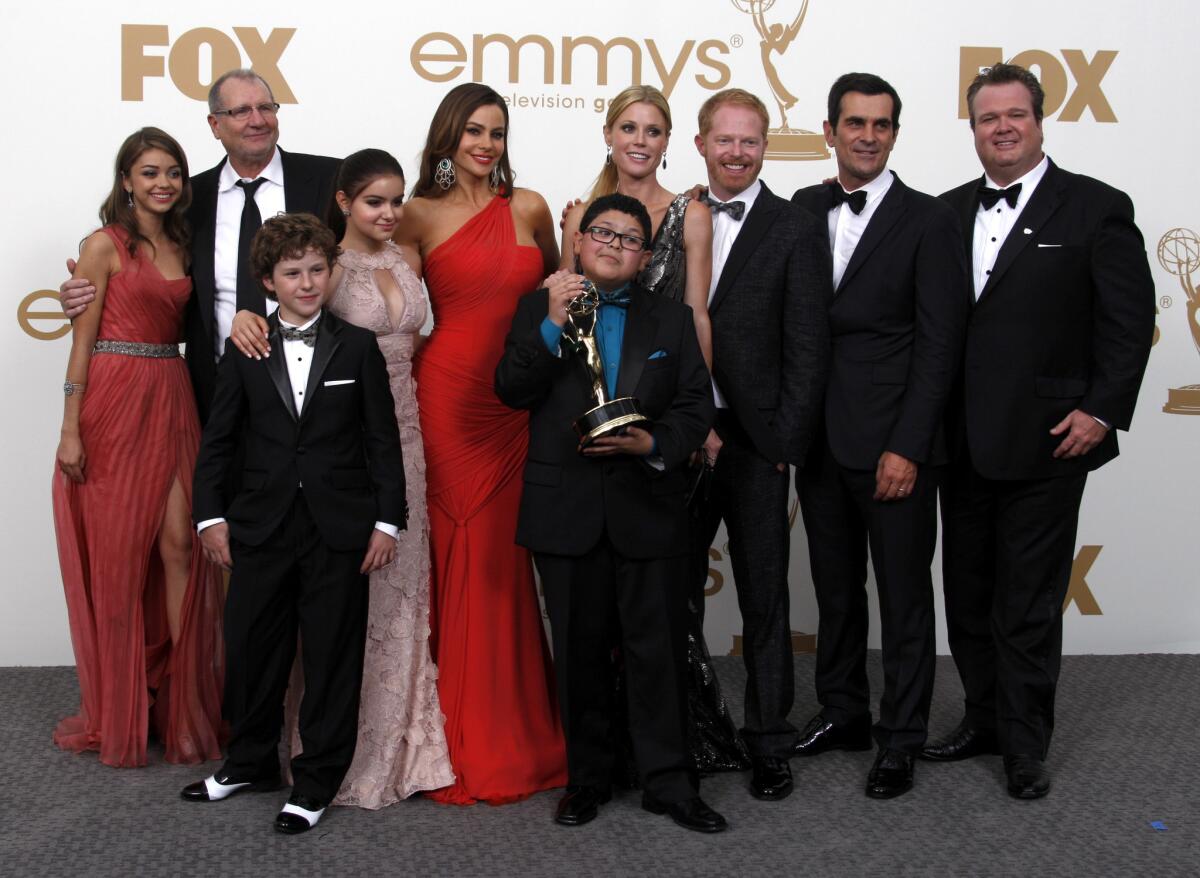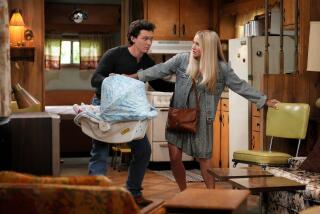‘Modern Family,’ a longtime Emmy favorite, paved the way and stepped aside

“Modern Family” should never have worked. Look at its components. Creators Steve Levitan and Christopher Lloyd assembled an ensemble cast of 10, four of whom were children. They even threw in a baby, for the love of Pete. The single-camera sitcom, premiering on ABC in 2009, employed a faux-documentary style that was never explained and a comedic mashup that combined edgy jokes, slapstick, clowning, “I Love Lucy” shenanigans and “Three’s Company” double entendres, all topped off with tender voice-overs.
But it added up to a smashing hit, as popular as it was critically acclaimed. The show racked up 18 Primetime Emmy Awards over 11 seasons and a 4.2 rating for its pilot, a number notable at the time and unimaginable today.
Twelve years ago, Lloyd and Levitan were in their office, trying to come up with series ideas and cracking each other up with stories about their wives and kids, when they realized those stories could be a series.
“We said, there is an opportunity for a family sitcom that isn’t pitched to the kids; it can be a little more sophisticated, a little more fun and with a single-camera perspective,” Lloyd recalls. “What would that family be? There is no single family that represents the American family anymore, because we’ve evolved. So we thought, ‘OK, maybe we can choose three different kinds of families and capture it a little bit that way.’” At first the families were unrelated, but once they put the three groups together, “That was the moment when we realized, oh yeah, that’s definitely a show,” he says.
They conjured up the goofy magic-loving man-child Phil Dunphy (Ty Burrell); his uptight yet fearless wife, Claire (Julie Bowen); and their children, Haley (Sarah Hyland), Alex (Ariel Winter) and Luke (Nolan Gould). Next came Claire’s brother, Mitchell (Jesse Tyler Ferguson), also uptight but not as fearless; his husband, Cam (Eric Stonestreet), a down-home farm boy with a love for all things over the top; and their adopted Vietnamese baby, Lily (played by Ella and Jaden Hiller in Seasons 1 and 2, after which Aubrey Anderson-Emmons took over the role). Rounding out the group was Claire and Mitchell’s irascible father, Jay (Ed O’Neill); his gorgeous, fiery Colombian wife, Gloria (Sofia Vergara); and her urbane young son, Manny (Rico Rodriguez).
The roster made for an endless array of conflicts, and the style had the show jumping from one family to the next. “We did 250 episodes, and I felt like we probably could have done 100 more,” Lloyd says. “Given that we might have told three or four stories every episode, that means we came close to telling 1,000 stories on the series. So we explored a lot.”
Each family member constantly made terrible decisions. And they never, ever got away with any of them. All were flawed in every conceivable human way — heightened for humor’s sake, naturally — as well as loving, kind and, ultimately, forgiving. And every episode contained lines that were belly-laugh funny, like Gloria’s admonition for Luke to attend an evening of improv for his cousin’s sake: “Improv is no different than getting waterboarded. Just stay calm, go to a pleasant place in your mind, and remember that you’re not actually dying.” But for all its humor, it was the tender moments that gave the show its staying power.
Including a gay couple in a stable relationship, with a baby, was a radical move for a mainstream sitcom at the time. “I remember saying, ‘Well, there goes Middle America,’ but obviously we knew we had to do it,” Levitan says of the choice. And with that deceptively simple act, they helped transform the mainstream into something more accepting. The day after the “Modern Family” finale aired, “Schitt’s Creek” cocreator and star Dan Levy tweeted his love for the show to his friend Ferguson, noting, “What you and your show did made what I did possible.”
“The world has changed,” says Levitan. “It would be lovely to think that we contributed positively to that change.” So much so that by Season 7, Lloyd says, “We were getting criticized for not pushing the envelope enough. How we went from being on the verge of being radical to being hoary and old-fashioned in about eight years, I never figured out.”
As the series went on, the children grew up, more babies came, everyone made more mistakes and learned just a little bit from them. And while any show that lasts 11 seasons invariably loses some of its luster, the gang wanted to go out big. “We tried to challenge ourselves and take the characters to new places. That was a guiding principle in the final season,” says Lloyd. “We were also building toward sending them off on new paths in the life beyond ‘Modern Family,’ so they could kind of live on in a robust way in the minds of our audience.”
The finale aired on April 8; “Modern Family” members dispersed around the world just as families across the country were coalescing to shelter in place. The timing was lucky on several counts. The 11th season was only 18 episodes long. Had it been the usual 22, the finale couldn’t have been shot in time, and the show wouldn’t have had a chance to wrap up as sweetly as it did. In its final moment, made even more poignant now, the empty-nest Dunphys turned their porch light on, so everyone could find their way back home.
More to Read
The complete guide to home viewing
Get Screen Gab for everything about the TV shows and streaming movies everyone’s talking about.
You may occasionally receive promotional content from the Los Angeles Times.






